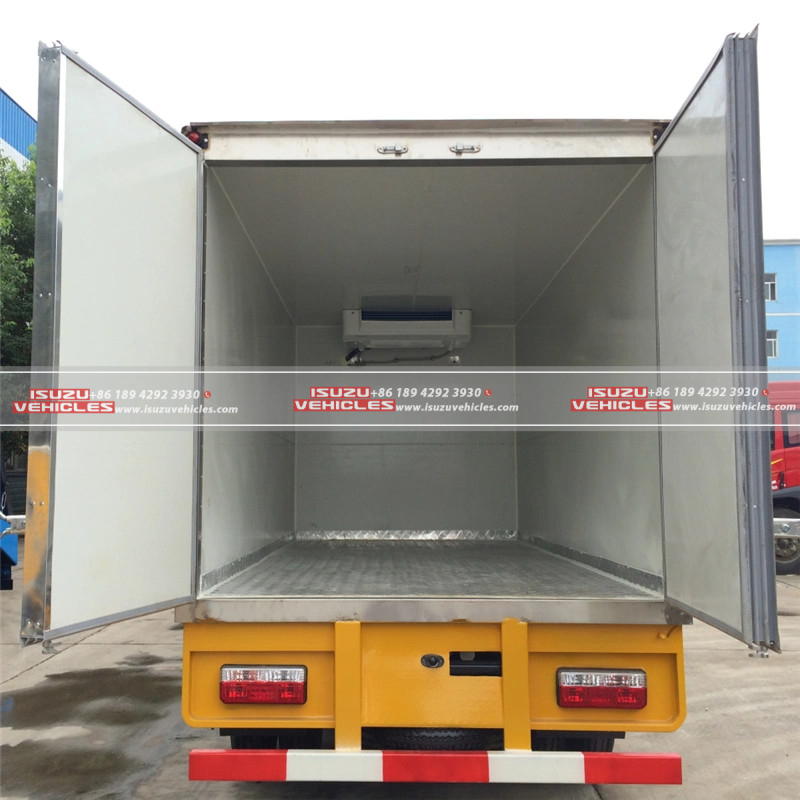Ecuador’s thriving agricultural export sector has taken a significant leap forward with the delivery of 50 new ISUZU refrigerated trucks, marking a major infrastructure investment to strengthen the country’s cold chain logistics. These state-of-the-art vehicles, comprising ISUZU FVR and NPR models with advanced temperature control systems, will primarily serve Ecuador’s $3.2 billion perishable goods industry, ensuring optimal conditions for products ranging from Andean berries to Amazonian fish during transport to domestic markets and international ports. The deployment comes at a critical time as Ecuador aims to reduce post-harvest food losses, currently estimated at 30% of annual production, while meeting stringent export standards for markets in the European Union and United States.
1. Strategic Deployment Across Key Agricultural Zones
The new ISUZU refrigerated trucks are being strategically allocated to support Ecuador’s most productive agricultural corridors:
Highland Regions (2,500-3,000m altitude)
- Transporting delicate roses and carnations from Cotopaxi nurseries to Quito’s airport at precisely maintained 2-4°C
- Hauling Andean dairy products including Páramo cheese from Tulcán to Guayaquil’s processing plants
Coastal Agricultural Belt
- Maintaining 8-10°C for banana and plantain shipments along the 300km Guayas-Manabí corridor
- Preserving shrimp and tuna harvests at -18°C during the 8-hour journey from Manta to Almacenes Tía distribution centers
Amazonian Provinces
- Specialized units with humidity control for exotic fruits like naranjilla and Amazonian cocoa beans
- Dual-temperature compartments allowing simultaneous transport of fresh produce and frozen goods
This geographic targeting addresses Ecuador’s unique logistical challenge of moving temperature-sensitive goods across dramatic altitude changes while maintaining uninterrupted cold chains.
2. Engineering Innovations for Tropical Conditions
The ISUZU refrigerated trucks feature several technological advancements specifically engineered for Ecuador’s demanding operating environment:
Climate-Adaptive Refrigeration
- Thermo King V-520 units with humidity control maintain optimal conditions despite 90%+ coastal humidity
- Multi-zone temperature capability (-25°C to +25°C) accommodates diverse cargo needs in single trips
- Solar-powered standby cooling prevents temperature spikes during loading/unloading in remote areas
Durability Enhancements
- 6HK1-TCS engines tuned for high-altitude performance in the Andes (20% more torque at 3,000m)
- Reinforced suspension systems withstand unpaved farm access roads in provinces like Loja and Morona Santiago
- Corrosion-resistant bodies with marine-grade aluminum components for coastal salt air protection
The trucks’ real-time telematics systems provide shippers with GPS-tracked temperature logs, a critical feature for EU export compliance documentation. Early adopters report a 40% reduction in produce rejection rates during trial shipments to Rotterdam.
3. Economic and Food Security Impacts
The fleet introduction is projected to generate substantial benefits across Ecuador’s food value chain:
- Export Growth: Potential $150M annual increase in agricultural exports by reducing spoilage (Central Bank estimates)
- Small Producer Inclusion: 3,500+ family farms now connected to Quito and Guayaquil markets through hub-and-spoke distribution
- Retail Price Stability: 15-20% decrease in seasonal price fluctuations for perishables in highland cities
- Employment Creation: 200+ new technician jobs for refrigeration system maintenance nationwide
Notably, the trucks’ dual-use capability allows daytime transport of non-perishables via ISUZU cargo truck configurations before converting to refrigerated mode for night-time produce runs, maximizing asset utilization.
4. Complementing Ecuador’s Evolving Logistics Network
The refrigerated fleet joins ISUZU’s growing presence in Ecuador’s commercial vehicle market, working in tandem with:
- ISUZU box trucks handling dry goods distribution in urban centers
- Existing ISUZU cargo truck fleets serving industrial and construction sectors
- Specialized milk tankers servicing Ecuador’s $1.4 billion dairy industry
With assembly capacity at ISUZU’s Quito plant now reaching 1,200 units annually, Ecuador is positioned to become a regional hub for cold chain vehicle production. The company has also established a dedicated training center for refrigeration system technicians, addressing a critical skills gap in Ecuador’s logistics workforce.
As Ecuador implements its National Cold Chain Development Plan, these ISUZU refrigerated trucks represent more than just vehicles—they are mobile infrastructure enabling farmers to meet global food safety standards while reducing waste in a country where 25% of the population remains food insecure. Their deployment underscores how targeted transportation investments can simultaneously drive export growth, environmental sustainability, and social development.
